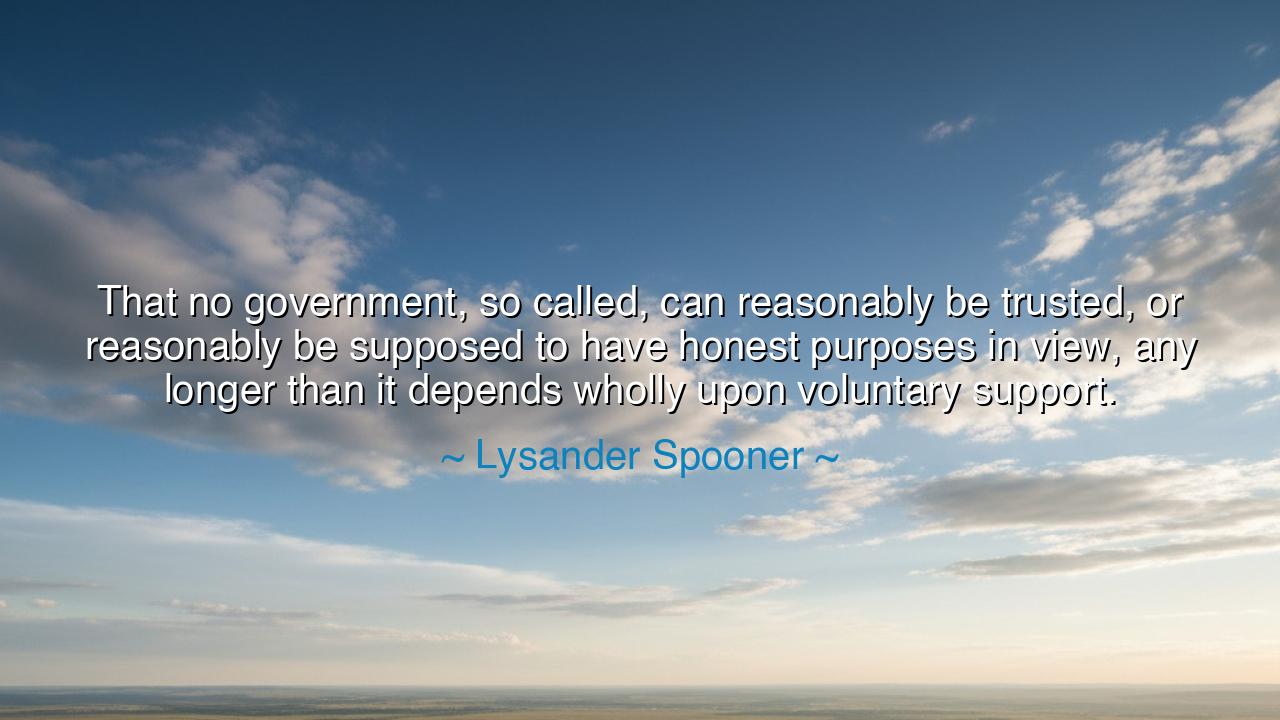
That no government, so called, can reasonably be trusted, or
That no government, so called, can reasonably be trusted, or reasonably be supposed to have honest purposes in view, any longer than it depends wholly upon voluntary support.






The words of Lysander Spooner—“That no government, so called, can reasonably be trusted, or reasonably be supposed to have honest purposes in view, any longer than it depends wholly upon voluntary support.”—strike like thunder across the centuries. They are not the words of comfort, but of fire, warning us of the nature of power. In them we hear the ancient struggle between rulers and the ruled, between liberty and tyranny. For Spooner declares plainly: a government cannot be trusted if it lives not by the free will of its people, but by coercion, by force, and by fear.
To the ancients, this truth was well known. The philosophers of Greece spoke of the difference between a king and a tyrant. The king rules with the consent of his people, upheld by loyalty freely given. The tyrant rules with chains, his throne resting not on love but on fear. Spooner’s words echo this ancient wisdom: a government is only honest while it breathes the air of voluntary support. When it departs from this, it becomes a beast feeding upon its people, claiming their lives and labor without their willing consent.
Consider the tale of the American Revolution. The colonists at first sought not independence but fairness, appealing again and again to the British Crown. But when their petitions were met with taxes imposed by force, soldiers quartered in their homes, and laws made without their voice, they understood Spooner’s truth. A government that rules without voluntary support becomes a master, not a servant. Thus they declared independence, choosing liberty with all its perils over the false security of submission. Their courage carved a new nation, proving that free support is the only soil where honest government can grow.
Yet history also reveals the ruin that comes when Spooner’s warning is ignored. Empires that grew fat on conquest and taxation, extracting wealth not from consent but from the sword, collapsed under their own corruption. Rome, once a republic built on shared duty, became an empire ruled by emperors who demanded obedience and bled the provinces dry. Its greatness crumbled, for it no longer rested on voluntary support, but on the brittle strength of legions and decrees. The lesson was carved into stone: when trust is replaced by compulsion, a government carries within itself the seed of its own destruction.
The power of Spooner’s words is not merely political, but personal. They remind us that true authority, whether of a ruler, a leader, or even a parent, rests not on the fear of punishment but on the free offering of respect. A leader who must compel loyalty has already lost it. A master who demands obedience by threat has no honor. Only when support is voluntary can trust be real, and only where trust is real can peace endure.
The lesson for us, children of the present age, is both caution and duty. Be wary of any power that demands your obedience without your consent, for such power cannot be trusted. Question those who rule, test their purposes, and withdraw support from any who govern through deceit or coercion. But also, be willing to give your voluntary support to that which is good, to leaders who earn it through honesty, fairness, and service. For just as governments decay when they abandon consent, they flourish when they are rooted in the willing loyalty of free people.
Practically, this means living awake. Pay attention to how your community, your leaders, your institutions wield power. Do not give blind allegiance, but offer your trust only where it is earned. Withhold it where it is abused. Participate, question, and hold rulers accountable, so that your support remains a gift, not a chain. And in your own life, rule not by force but by example—so that others follow you not from fear, but from respect freely given.
So let Spooner’s words stand as a watchtower over your heart: a government without voluntary support is not to be trusted. This is the eternal law of liberty—that power is rightful only when consent is its foundation. Remember this, live by it, and teach it to those who come after you. For in this truth lies the safeguard of freedom, and the hope of all generations.






AAdministratorAdministrator
Welcome, honored guests. Please leave a comment, we will respond soon